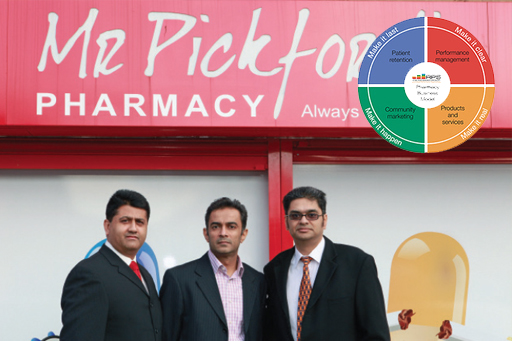Midlands pharmacy group improves performance through strategic approach
Record learning outcomes
An active focus on boosting commercial performance has brought results, says this independent
Independent contractors can use the sales techniques and strategic approaches used by larger companies to help grow their businesses – and improve what’s offered to patients – at a time when pharmacy funding is under pressure.
With government cuts in mind, Mukesh Lad, chief executive and superintendent pharmacist at Mr Pickford’s Pharmacy Group, has been looking at new ways to grow its revenue for the past six months. The group, with pharmacies in Leicestershire and Northamptonshire, has been working with consultants Retail Performance Specialists (RPS Ltd) to drive its business forward.

“The independent contractor needs to be a good business person, but we also need managerial expertise in how to run a commercial organisation like a multiple does,” says Mr Lad. “At Mr Pickford’s, we saw that funding cuts might be coming and decided we’d better start investing in the right way and training our staff to ensure we will still be around as a business. We needed to change our thinking to have a more commercial approach.”
Work to ‘grow the numbers’ by Mr Pickford’s pharmacies – to improve sales and profitability figures – has successfully increased its items by 30 per cent, grown OTC sales by 20 per cent and increased EPS nominations by one-third. MUR, NMS and flu services figures have also grown.
Working to a clear plan for boosting commercial performance has been very useful, says Mr Lad. “Unless you work in a structured way, you are not going to achieve your targets,” he says.
Encouraging people working in pharmacies to take a more commercial approach has been key for the company, he says. “First, it’s convincing the pharmacy team that relying on processing prescriptions is not how we will survive as a profitable business,” he says. “My message to staff is that community pharmacy is tough and is getting tougher. We are being chopped away by the government and we will not be making the same money that we did from just dispensing, so our business has to evolve.”
What has the process taught Mr Pickford’s?
To improve on revenue you have to be determined about what you want to achieve and get on with the job, says Mr Lad. “You’ve got to be tough,” he says. “Don’t hang about – get those results tomorrow.”
The programme encouraged the group to identify opportunities to support customers and patients more than before. “Find opportunities to improve sales – maybe to offer more when someone has a cough or cold – and work out what staff need to say to have that conversation with the customer,” says Mr Lad. “Then you can start to move the numbers, to improve your performance on that particular factor. Moving the numbers is the best part for me. For example, let’s have 20 more people sign up for our repeat collection service this week; four people a day. We’ll do everything else, too, but that’s the target we need to meet.
“We’ve found that once staff do start to do this, they love it. Say a customer has a headache; they’ve tried one analgesic, but still have the headache and you now give them some other options. They also happen to be a blood pressure patient, and that could have something to do with the headache. Why not suggest they have a blood pressure monitor at home, so they can monitor their BP?”
This is about adding benefit to the patient and not just making the sale, says Mr Lad. “The important thing for us is to add things that make a difference. You are helping the patient and they appreciate that, but you’ve also made a commercial transaction that’s for the benefit of the business.”
Achieving the changes has taken new thinking, as much for directors as for pharmacy managers and staff, says Mr Lad. “You’ve got to believe from the start that you are going to structurally change your organisation and the way it thinks, to change, not only your own mindset, but that of your people,” he says. “That’s not always easy for someone who has been in the business for, say, 20 years.” But the reality is that community pharmacies in England will have to find ways to recoup the lost funding that’s being removed by the government.
“The average shortfall for each of our pharmacies is going to be probably £4,000 to £5,000 a month and over a year we are looking at £35,000 to £40,000,” says Mr Lad. “That’s the equivalent of losing two dispensers, and we can’t afford to do that.”
The results for Mr Pickford’s look promising and Mr Lad predicts that these new ways of working will soon be fully embedded in the business. “Next we’re working to get consistency in delivering these results month by month,” he says. “If you want to run a marathon, you have to train over time until you know you are fine to run the race. We’re working towards our marathon, and in six months our teams will be over the line with flying colours.”
Find out more
Dennis Reid of Retail Performance Specialists is a retail specialist who helps companies increase sales, performance and profitability. He has more than 35 years’ experience and has worked with major companies including Nike, Gucci, Nokia and Marks & Spencer.
He works with community pharmacies to deliver the Pharmacy Growth Programme, and is so confident in the team’s expertise that the company is guaranteeing a 10-fold return on investment over 18 months or your fee returned.
- To explore how the Pharmacy Growth Programme could benefit your business, call Andrew Reid on 01344 849397, or email andrew@rps-global.com
